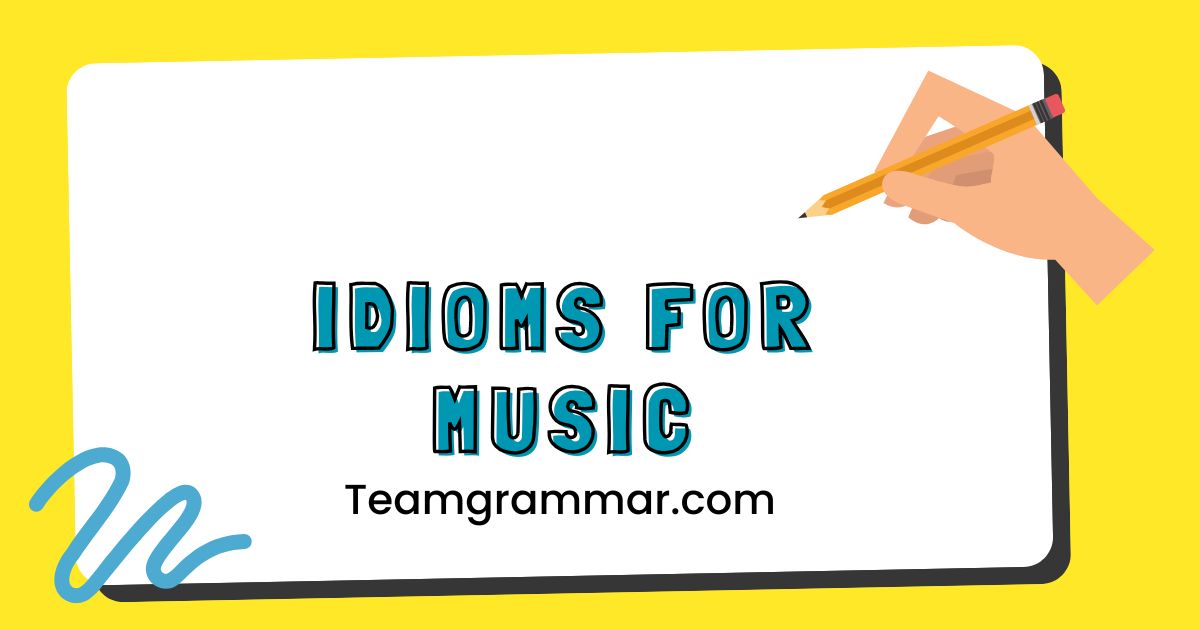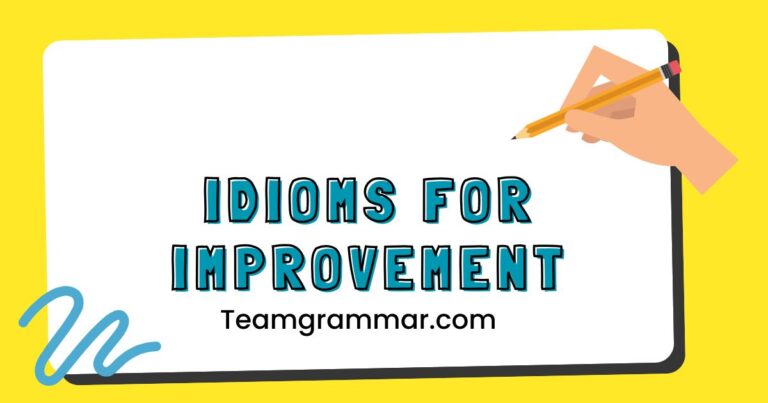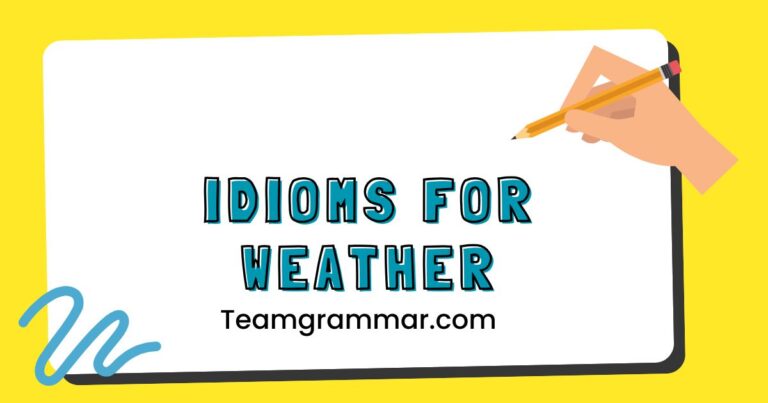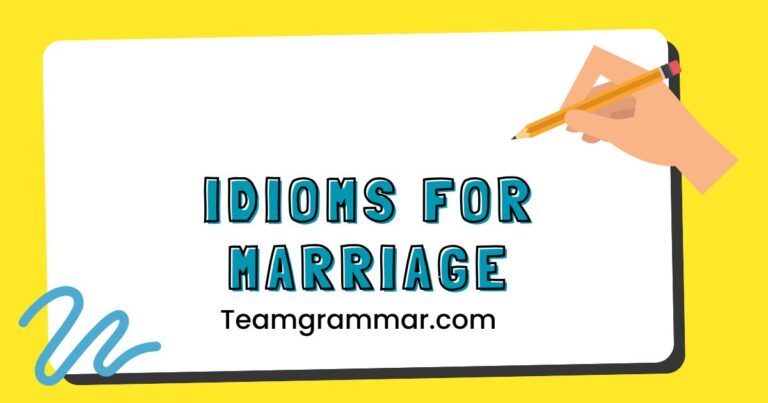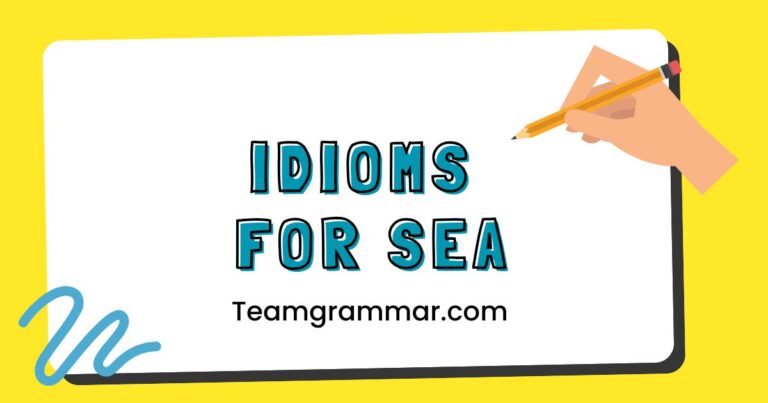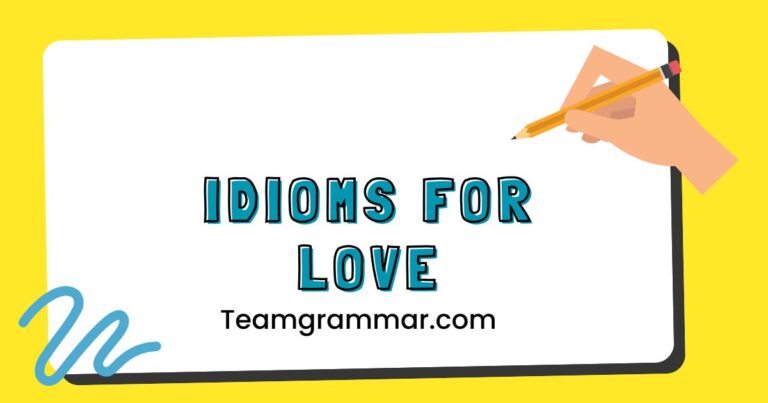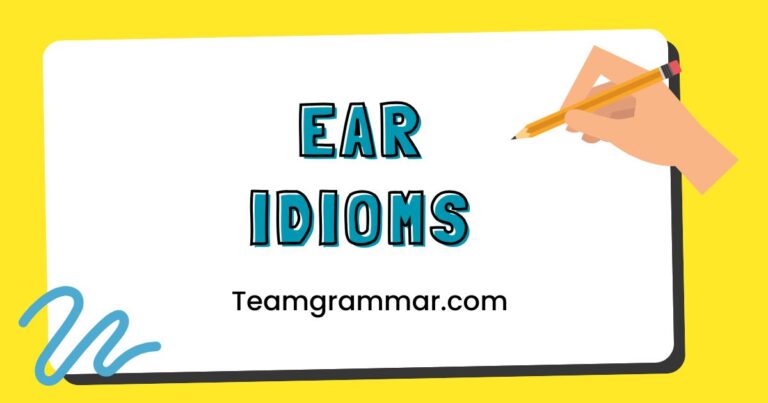39 Idioms for Music: A Comprehensive Guide to Musical Expressions
Music-related idioms enrich the English language, providing colorful and expressive ways to communicate ideas that extend far beyond the realm of melodies and harmonies. These idioms often draw parallels between musical concepts and everyday experiences, adding depth and nuance to conversations, writing, and even professional communication.
Understanding these idioms is crucial for anyone looking to enhance their comprehension of English, particularly in informal contexts and creative writing. This article is designed for English language learners of all levels, music enthusiasts, and anyone interested in exploring the fascinating intersection of language and music.
By mastering these idioms, you’ll gain a better grasp of figurative language and improve your overall communication skills.
Table of Contents
- Introduction
- Definition of Music Idioms
- Structural Breakdown
- Types and Categories of Music Idioms
- Tempo-Related Idioms
- Pitch-Related Idioms
- Harmony-Related Idioms
- Instrument-Related Idioms
- Performance-Related Idioms
- Examples of Music Idioms
- Tempo-Related Examples
- Pitch-Related Examples
- Harmony-Related Examples
- Instrument-Related Examples
- Performance-Related Examples
- Usage Rules for Music Idioms
- Common Mistakes with Music Idioms
- Practice Exercises
- Advanced Topics
- Frequently Asked Questions
- Conclusion
Definition of Music Idioms
Music idioms are expressions that use musical terms or metaphors to convey meanings beyond their literal definitions. These idioms are a form of figurative language, where the intended meaning is different from the dictionary definitions of the individual words.
They often rely on shared cultural understanding and the emotional associations people have with music. Understanding music idioms helps in interpreting nuanced communication and appreciating the creative use of language.
Idioms, in general, are phrases or expressions whose meanings cannot be understood from the literal meanings of the individual words. Music idioms specifically borrow from the vocabulary of music – terms like “tempo,” “pitch,” “harmony,” and references to instruments and performances – to describe non-musical situations, emotions, or ideas.
They add color and depth to the English language, making it more expressive and engaging. The context in which these idioms are used is crucial for proper interpretation.
The function of music idioms is to provide a more vivid and relatable way to express abstract concepts or complex emotions. For instance, instead of saying someone is behaving erratically, you might say they are “playing a different tune.” This idiom evokes a sense of inconsistency or change in behavior, drawing on the musical image of switching to a different melody.
The use of idioms can make communication more efficient and impactful, provided the audience understands the intended meaning. Music idioms can be found in everyday conversation, literature, journalism, and even professional settings.
Structural Breakdown
Music idioms, like all idioms, typically consist of a fixed sequence of words that function as a single unit of meaning. The structure often involves a musical term (e.g., “tune,” “note,” “song”) combined with other words to create a figurative expression.
The individual words within the idiom cannot be altered without changing or destroying the meaning of the idiom. The grammatical structure can vary, including verb phrases, noun phrases, and even entire clauses.
Many music idioms follow a pattern where a musical action or state is applied to a non-musical subject. For example, “to strike a chord” involves the musical action of striking a chord on an instrument, but the idiom means to resonate emotionally with someone.
This pattern highlights the connection between musical experiences and emotional responses. Other idioms might use musical terms to describe qualities or characteristics, such as “music to my ears,” which describes something pleasing or agreeable.
The figurative meaning is derived from the emotional associations with the musical term.
Understanding the underlying structure of music idioms can help in deciphering their meaning. The key is to recognize the musical term and consider its common associations.
For instance, “singing the blues” refers to the musical genre of blues, which is typically associated with sadness and lament. Therefore, the idiom means to express feelings of sadness or depression.
Recognizing these patterns and associations can make it easier to understand and remember music idioms.
Types and Categories of Music Idioms
Music idioms can be categorized based on the musical concepts they draw upon. These categories include tempo, pitch, harmony, instrument, and performance.
Each category represents a different aspect of music and provides a unique set of idioms with specific meanings and applications. Categorizing them can help learners understand the nuances and associations within each group.
Tempo-Related Idioms
Tempo-related idioms use terms related to the speed or pace of music to describe the rate at which something happens or progresses. They often convey a sense of urgency, relaxation, or irregularity.
These idioms are useful for describing the speed of events, projects, or personal progress. Understanding these idioms involves recognizing the association between musical tempo and the pace of life.
Pitch-Related Idioms
Pitch-related idioms use terms related to the highness or lowness of a musical note to describe the quality or intensity of something. They can convey a sense of agreement, disagreement, or emotional tone.
These idioms are particularly effective for describing communication styles and emotional states. Recognizing the connection between musical pitch and emotional expression is key to understanding these idioms.
Harmony-Related Idioms
Harmony-related idioms use terms related to the combination of musical notes to create a pleasing sound to describe agreement, balance, or cooperation. They often convey a sense of unity or discord.
These idioms are useful for describing relationships, teamwork, and social interactions. Understanding the concept of musical harmony and its association with balance and agreement is crucial for interpreting these idioms.
Instrument-Related Idioms
Instrument-related idioms use references to specific musical instruments to describe roles, characteristics, or situations. They often draw on the perceived qualities or functions of the instrument.
These idioms can add a layer of imagery and symbolism to communication. Understanding the associations people have with different musical instruments is essential for grasping the meaning of these idioms.
Performance-Related Idioms
Performance-related idioms use terms related to musical performances, such as concerts, rehearsals, or auditions, to describe events, actions, or behaviors. They often convey a sense of skill, effort, or outcome.
These idioms are useful for describing presentations, competitions, and other types of public performances. Recognizing the different aspects of musical performance and their associated challenges and rewards is key to understanding these idioms.
Examples of Music Idioms
The following sections provide examples of music idioms categorized by tempo, pitch, harmony, instrument, and performance. Each category includes a table with examples, definitions, and example sentences to illustrate their usage.
These examples will help you understand the context and meaning of each idiom, making it easier to incorporate them into your own communication.
Tempo-Related Examples
These idioms use concepts of musical tempo to describe the speed at which things happen or progress. They can convey a sense of urgency, slowness, or change in pace.
Below are several examples in table format.
| Idiom | Definition | Example Sentence |
|---|---|---|
| Change your tune | Alter your opinion or attitude | He used to be against the project, but he’s starting to change his tune. |
| For a song | Very cheaply | I bought this antique table for a song at the flea market. |
| Sing a different tune | Express a different opinion or behave differently | After the evidence was presented, the witness began to sing a different tune. |
| Call the tune | Be in control or make the decisions | As the CEO, she gets to call the tune in the company. |
| Keep pace with | Move or progress at the same rate as someone or something else | We need to innovate to keep pace with our competitors. |
| Set the pace | Establish the rate of progress | Our new product is setting the pace for innovation in the industry. |
| At a snail’s pace | Very slowly | The construction work is progressing at a snail’s pace. |
| In sync | Working well together; in agreement | The team is finally in sync and producing great results. |
| Out of sync | Not working well together; not in agreement | The project failed because the team members were out of sync. |
| Hit the right note | Do or say something suitable or appropriate | His speech hit the right note with the audience. |
| Strike the right chord | To evoke a positive emotion or reaction | The company’s new advertising campaign struck the right chord with consumers. |
| Blow the whistle | Report wrongdoing or illegal activity | He decided to blow the whistle on the company’s fraudulent practices. |
| Face the music | Accept the consequences of one’s actions | After lying to his parents, he had to face the music. |
| Jam session | An informal music session | The musicians had a jam session after the concert. |
| March to the beat of your own drum | Do things your own way, independently | She’s always marched to the beat of her own drum and never worried about fitting in. |
| Fine-tune | Make small adjustments to improve something | We need to fine-tune the marketing strategy to reach a wider audience. |
| Play it by ear | Decide how to deal with a situation as it develops, rather than planning in advance | We don’t have a fixed itinerary; we’ll just play it by ear. |
| Second fiddle | A subordinate or less important position | He’s tired of playing second fiddle to his older brother. |
| In the limelight | The center of public attention | The actress has been in the limelight since her breakthrough role. |
| Make a song and dance about something | Create a fuss or unnecessary commotion about something | Don’t make a song and dance about it; it’s just a small mistake. |
| With bells on | Eagerly and enthusiastically | I’ll be there with bells on! |
| End on a high note | Finish something successfully or positively | The company ended the year on a high note with record profits. |
Pitch-Related Examples
These idioms use concepts of musical pitch to describe the quality or intensity of something. They often relate to agreement, disagreement, or emotional tone.
The following table provides examples.
| Idiom | Definition | Example Sentence |
|---|---|---|
| Music to my ears | Something that is pleasing or welcome to hear | The news of his promotion was music to my ears. |
| Blow your own trumpet | Brag about your own achievements | He’s always blowing his own trumpet about his accomplishments. |
| Strike a sour note | Create a negative or unpleasant impression | His rude comment struck a sour note at the meeting. |
| Tone-deaf | Lacking awareness of the feelings or needs of others; insensitive | His response to the crisis was completely tone-deaf. |
| As clear as a bell | Very clear and easy to understand | The instructions were as clear as a bell. |
| Ring a bell | Sound familiar; remind someone of something | His name rings a bell, but I can’t remember where I’ve heard it before. |
| Sing someone’s praises | Praise someone enthusiastically | The manager was singing her praises after the successful project. |
| Hit the high notes | Achieve great success or reach a peak | The company hit the high notes with its new product launch. |
| Fall flat | Fail to produce the intended effect | His joke fell flat, and no one laughed. |
| On the same wavelength | Thinking alike; in agreement | They’re always on the same wavelength and work well together. |
| Make light of | Treat something serious as if it were not | He tried to make light of the situation, but it was actually quite serious. |
| High-pitched | (Of a sound) having a high frequency | The smoke alarm emitted a high-pitched sound. |
| Pitch in | Help out; contribute | Everyone pitched in to get the project done on time. |
| Clear the air | Resolve a conflict or misunderstanding | They had a long talk to clear the air after the argument. |
| In tune with | In harmony or agreement with | The company is in tune with the latest market trends. |
| Out of tune with | Not in harmony or agreement with | His views are out of tune with the rest of the group. |
| Sounding board | A person who listens to your ideas and provides feedback | He uses his friend as a sounding board for his business ideas. |
| A broken record | Someone who repeats the same thing over and over | He’s like a broken record; he’s always complaining about the same things. |
| Sing from the same hymn sheet | Agree on the same principles or policies | The team needs to sing from the same hymn sheet to achieve its goals. |
| Sing for your supper | Earn your keep; provide a service in return for something | He had to sing for his supper by doing chores around the house. |
Harmony-Related Examples
These idioms use concepts of musical harmony to describe agreement, balance, or cooperation. They often convey a sense of unity or discord.
Here are some examples in table format.
| Idiom | Definition | Example Sentence |
|---|---|---|
| In harmony | In agreement or working well together | The choir sang in perfect harmony. |
| Out of harmony | In disagreement or not working well together | Their political views are completely out of harmony. |
| A harmonious relationship | A relationship characterized by agreement and cooperation | They have a harmonious relationship based on mutual respect. |
| Strike a balance | Find a compromise or equilibrium | It’s important to strike a balance between work and leisure. |
| In concert | Working together in a coordinated way | The different departments worked in concert to achieve the company’s goals. |
| A symphony of flavors | A complex and pleasing combination of tastes | The chef created a symphony of flavors in the dish. |
| A dissonant note | Something that is out of place or in disagreement | His negative attitude struck a dissonant note at the meeting. |
| Find common ground | Discover shared interests or opinions | They tried to find common ground to resolve the dispute. |
| Work in unison | Work together in perfect agreement | The dancers moved in unison during the performance. |
| A well-orchestrated effort | A carefully planned and coordinated effort | The project was a well-orchestrated effort that involved many different teams. |
| Blend in | To conform or assimilate into a group or environment | She tried to blend in with the local culture during her travels. |
| Resonate with | To evoke emotions or agreement | His speech resonated with many people in the audience. |
| A chorus of approval | Widespread and enthusiastic agreement | There was a chorus of approval when the new policy was announced. |
| Chime in | Join a conversation or discussion | He chimed in with his own opinion on the matter. |
| In agreement | Having the same opinion or belief | They were in agreement on the best course of action. |
| On the same page | Having the same understanding or information | We need to make sure everyone is on the same page before we start the project. |
| Pull together | Work together to achieve a common goal | We need to pull together to overcome this challenge. |
| Sing in chorus | Express the same opinion or belief together | The protesters sang in chorus to make their voices heard. |
| Find harmony in | Discover agreement or balance in something | They tried to find harmony in their differing opinions. |
Instrument-Related Examples
These idioms use references to specific musical instruments to describe roles, characteristics, or situations. They often draw on the perceived qualities or functions of the instrument.
Here are some examples presented in a table.
| Idiom | Definition | Example Sentence |
|---|---|---|
| Trump card | A valuable resource or advantage, often kept hidden until needed | He played his trump card and secured the deal. |
| Pull out all the stops | Do everything possible to succeed | They pulled out all the stops to win the competition. |
| Play second fiddle | Be in a subordinate or less important position | He’s tired of playing second fiddle to his colleague. |
| Blow your own horn | Brag about your own achievements | She’s always blowing her own horn about her accomplishments. |
| Fine-tune | Make small adjustments to improve something | We need to fine-tune the marketing strategy to reach a wider audience. |
| Call the shots | Make the decisions or be in control | As the manager, she gets to call the shots in the team. |
| Strike a chord | Evoke a positive emotion or reaction | The company’s new advertising campaign struck a chord with consumers. |
| Sounding board | A person who listens to your ideas and provides feedback | He uses his friend as a sounding board for his business ideas. |
| Pipe dream | An unrealistic hope or plan | His idea of becoming a famous actor is just a pipe dream. |
| Tune out | Stop paying attention or listening | I tend to tune out when he starts talking about politics. |
| A one-man band | Someone who does many different jobs or tasks | He’s a one-man band, handling everything from sales to marketing. |
| Play a waiting game | Delay taking action in order to see how a situation develops | We’re playing a waiting game to see what our competitors do. |
| Learn the ropes | Learn the basics of a job or task | It takes time to learn the ropes when you start a new job. |
| In full swing | At the height of activity or progress | The party was in full swing by midnight. |
| Get into the swing of things | Become accustomed to a new routine or activity | It took a few weeks to get into the swing of things at the new job. |
| Hit the right notes | Say or do the right things to achieve a desired result | The politician hit the right notes in his speech and won over the crowd. |
Performance-Related Examples
These idioms use terms related to musical performances, such as concerts, rehearsals, or auditions, to describe events, actions, or behaviors. They often convey a sense of skill, effort, or outcome.
The following table provides some examples.
| Idiom | Definition | Example Sentence |
|---|---|---|
| Take center stage | Become the focus of attention | The new product took center stage at the conference. |
| Steal the show | Attract the most attention and praise | The child actor stole the show with his performance. |
| A tough act to follow | A performance or achievement that is difficult to surpass | His success will be a tough act to follow. |
| Behind the scenes | In a private or less visible role | She works behind the scenes to make sure everything runs smoothly. |
| Dress rehearsal | A final practice before a performance | We had a dress rehearsal before the opening night of the play. |
| Curtain call | The applause and bows at the end of a performance | The actors received a standing ovation and several curtain calls. |
| Encore | An extra performance given at the end of a show | The band played an encore after the audience cheered loudly. |
| Waiting in the wings | Ready to take over a role or position | He’s waiting in the wings to become the next CEO. |
| Go solo | Perform or work independently | She decided to go solo and start her own business. |
| In the spotlight | The center of public attention | The actress has been in the spotlight since her breakthrough role. |
| A standing ovation | Enthusiastic applause with people standing up | The speaker received a standing ovation after his inspiring speech. |
| Onstage | Performing in front of an audience | He felt nervous being onstage for the first time. |
| Offstage | Not performing or visible to the audience | She prefers to work offstage as a stage manager. |
| Make your debut | Give your first public performance | She made her debut as a singer at the local club. |
| A showstopper | A performance that is particularly impressive or exciting | The final song was a showstopper that brought the house down. |
| A hard act to follow | A performance or achievement that is difficult to surpass | His speech was a hard act to follow. |
| Go through the motions | Do something without enthusiasm or genuine effort | He was just going through the motions at work, not really engaged. |
Usage Rules for Music Idioms
Music idioms should be used appropriately in context to avoid miscommunication. It is important to consider the audience and the setting when using idioms, as they may not be universally understood.
Informal settings, such as conversations with friends or creative writing, are generally more suitable for idioms than formal settings, such as academic papers or business reports. However, even in formal settings, idioms can be used sparingly to add emphasis or color to your writing, provided they are well-chosen and clearly understood.
One key rule is to avoid mixing idioms or using them incorrectly. For example, it would be incorrect to say “He’s calling the music” when the correct idiom is “He’s calling the tune.” Mixing idioms can lead to confusion and make your communication less effective.
It is also important to use idioms that are appropriate for the situation. For instance, using a humorous idiom in a serious situation could be considered insensitive.
Another important aspect of using music idioms correctly is understanding their connotations. Some idioms may have negative connotations, while others may have positive connotations.
For example, “singing the blues” has a negative connotation, as it refers to expressing sadness or depression. On the other hand, “music to my ears” has a positive connotation, as it refers to something pleasing or welcome to hear.
Being aware of these connotations can help you choose the right idiom for the message you want to convey.
Common Mistakes with Music Idioms
One of the most common mistakes is using idioms out of context. An idiom’s meaning is dependent on the situation, and using it inappropriately can lead to confusion.
For example, saying “He’s singing the blues” when someone is simply feeling a bit tired doesn’t fit the idiom’s connotation of deep sadness. This is incorrect because the idiom is meant to express deeper, more significant feelings of sadness or depression, not just a mild case of tiredness.
Another frequent error is misinterpreting the meaning of an idiom. Because idioms are not literal, guessing their meaning based on the individual words can be misleading.
For instance, “blow your own trumpet” doesn’t mean literally playing a trumpet, but rather boasting about oneself. A common incorrect interpretation would be to think it refers to musical talent or skill.
The correct understanding is that it’s about self-promotion, often in an arrogant way.
Mixing up idioms is also a common mistake. This happens when parts of two or more idioms are combined, resulting in a nonsensical phrase.
For example, saying “He’s changing his horn” instead of “He’s changing his tune” or “He’s blowing his own trumpet” creates a nonsensical statement. The correct idioms are “change his tune,” meaning to alter one’s opinion, and “blow your own trumpet,” meaning to brag about oneself.
Here is a table demonstrating common mistakes when using music idioms:
| Incorrect | Correct | Explanation |
|---|---|---|
| He’s calling the music. | He’s calling the tune. | Incorrect idiom mixing. The correct idiom is “call the tune,” meaning to be in control. |
| She’s singing a different song. | She’s singing a different tune. | Incorrect word choice within the idiom. The correct idiom is “sing a different tune,” meaning to change one’s opinion or behavior. |
| He blew his own flute. | He blew his own trumpet. | Using the wrong instrument. The correct idiom is “blow your own trumpet,” meaning to boast about oneself. |
| The news was music to my ears, so I started singing the blues. | The news was music to my ears, I was so happy! | Using conflicting idioms. “Music to my ears” means good news, while “singing the blues” means being sad. |
| They are in harmony but out of tune. | They are in harmony and in tune. | Contradictory phrases. You cannot be in harmony and out of tune simultaneously in the figurative sense. |
Practice Exercises
Test your understanding of music idioms with these exercises. Fill in the blanks with the correct idiom from the list provided.
This will help you reinforce your knowledge and improve your ability to use these idioms in context.
Idiom List: Change your tune, for a song, face the music, strike a chord, blow the whistle, play it by ear, keep pace with, second fiddle, in the limelight, with bells on
- He had to ___________ after he was caught cheating on the exam.
- I’ll be there ___________, ready to help in any way I can.
- She decided to ___________ on the company’s illegal activities.
- The politician’s speech ___________ with many voters.
- We don’t have a detailed plan; we’ll just ___________ .
- The company is struggling to ___________ its competitors.
- He used to disagree, but he’s starting to ___________ .
- I bought this vintage guitar ___________ at a garage sale.
- She enjoys being ___________ , receiving attention for her accomplishments.
- He’s tired of playing ___________ to his more successful colleague.
Answer Key:
- face the music
- with bells on
- blow the whistle
- struck a chord
- play it by ear
- keep pace with
- change your tune
- for a song
- in the limelight
- second fiddle
Exercise 2: Multiple Choice
Choose the correct meaning of the idiom in each sentence.
- The news was music to my ears.
- The news was loud.
- The news was pleasing.
- The news was confusing.
- He’s always blowing his own trumpet.
- He’s always playing music.
- He’s always boasting.
- He’s always lying.
- The project is in full swing.
- The project is finished.
- The project is at its peak.
- The project is failing.
- She stole the show with her performance.
- She committed a crime.
- She attracted the most attention.
- She ruined the performance.
- He had to face the music for his actions.
- He had to listen to music.
- He had to accept the consequences.
- He had to practice music.
- They are on the same wavelength.
- They are arguing.
- They have the same ideas.
- They are far apart.
- The comedian’s joke fell flat.
- The joke was successful.
- The joke was funny.
- The joke failed.
- The company is trying to strike a balance.
- The company is trying to find a compromise.
- The company is trying to cause conflict.
- The company is trying to fail.
- The child marchs to the beat of his own drum.
- The child is following others.
- The child is doing things independently.
- The child is failing at music.
- The company is looking for a new sounding board.
- The company is looking for a new instrument.
- The company is looking for a new consultant.
- The company is looking for a new musician.
Answer Key:
- b
- b
- b
- b
- b
- b
- c
- a
- b
- b
Advanced Topics
For advanced learners, exploring the origins and evolution of music idioms can provide a deeper understanding of their cultural significance. Many music idioms have historical roots in specific musical practices or social contexts.
Researching these origins can reveal fascinating insights into the way language and culture intersect. Additionally, analyzing the use of music idioms in literature and media can enhance your appreciation of their artistic and rhetorical impact.
Another advanced topic is the cross-cultural adaptation of music idioms. While some idioms may have direct equivalents in other languages, others may require creative translation or adaptation to convey the same meaning.
Exploring these cross-cultural differences can broaden your linguistic awareness and improve your ability to communicate effectively in diverse settings. This involves understanding not just the literal translation but also the cultural context that gives the idiom its true meaning.
Furthermore, consider the creation of new music idioms. Language is constantly evolving, and new idioms emerge over time to reflect changing cultural trends and experiences.
Analyzing these newly coined idioms can provide insights into contemporary social values and attitudes. This involves staying attuned to current language use and understanding the metaphors and associations that drive the creation of new expressions.
Frequently Asked Questions
Conclusion
Music idioms offer a rich and expressive way to communicate ideas and emotions, adding color and depth to the English language. By understanding the types, structures, and usage rules of these idioms, you can enhance your comprehension of figurative language and improve your overall communication skills.
Whether you are an English language learner, a music enthusiast, or simply someone who appreciates the creative use of language, mastering music idioms will enrich your linguistic repertoire and broaden your cultural awareness. So, embrace the music of language and let these idioms strike the right chord in your conversations and writings!

